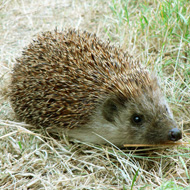Garden sightings of hedgehogs in decline

A quarter of participants across the UK said they had never seen a hedgehog in their garden.
The number of hedgehog sightings in UK gardens is continuing to decline, new data from the RSPB suggests. In fact, the population is now thought to have dipped below one million.
There were 13 per cent fewer reported sightings in the UK this year, compared to figures from 2014.
In Greater London, fewer than 6 per cent of survey participants reported seeing hedgehogs in their garden at least once a month. This is a startling 20 per cent lower than the national average.
Meanwhile, a quarter of participants across the UK said they had never seen a hedgehog in their garden - up by 11 per cent since 2014.
Foxes and grey squirrels, on the other hand, appear to be far more frequent visitors. Over 80 per cent of Londoners had spotted a fox in their garden at least once a month this year. Grey squirrels were the most common visitor, with 76 per cent of UK participants seeing one scurrying across the garden at least once a month.
The RSPB says gardeners can play a pivotal role in reversing declines in some species. Members of the public are being urged to get involved in 'Giving Nature a Home', doing at least one thing to help wildlife in their garden or outdoor space.
"Something as small as creating gaps in fences to allow hedgehogs to roam can have huge benefits to the population in your area," said communications officer Tim Webb.
The charity launched a new online tool this week that allows people to create their own personalised plan to help nature. It targets the user's own favourite species, as well as wildlife that is struggling in their part of the country. To find out more, visit rspb.org.uk/plan



 RCVS Knowledge has welcomed Professor Peter Cockcroft as editor-in-chief for Veterinary Evidence.
RCVS Knowledge has welcomed Professor Peter Cockcroft as editor-in-chief for Veterinary Evidence.